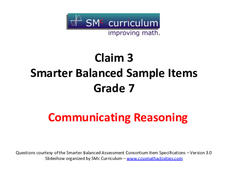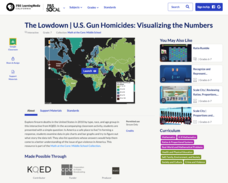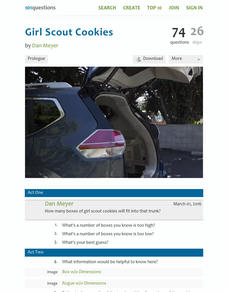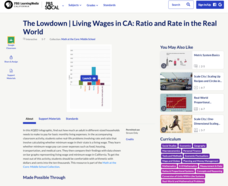PHET
Proportion Playground
Ratios are all around you. A fun interactive has scholars investigate ratios and proportions in different situations. These include creating bracelets with different ratios of beads, mixing paint, adjusting the length and width of a...
CCSS Math Activities
Smarter Balanced Sample Items: 6th Grade Math – Target A
Only in math problems do people buy 18 cans of tennis balls and no one wonders why. Scholars solve for the number of total tennis balls given the ratio of balls per can. This and other ratio word problems in a PowerPoint from Grade 6...
CCSS Math Activities
Smarter Balanced Sample Items: 7th Grade Math – Claim 4
Build the model right out of the box. A few sample items show teachers how Smarter Balanced assessments may approach Claim 4, modeling and data analysis. Pupils use their skills to create equations or expressions to model the situation...
CCSS Math Activities
Smarter Balanced Sample Items: 7th Grade Math – Claim 3
Does the explanation make sense? Sample items highlight claim three, communicating reason, in the Smarter Balanced assessments. Teachers use the 16 items to help show pupils the importance of communication and reasoning within...
CCSS Math Activities
Smarter Balanced Sample Items: 7th Grade Math – Claim 2
To solve or not to solve that is the problem. A slide presentation of 17 items show different ways that Smarter Balanced assesses Claim 2, problem solving. The items span from sixth and seventh grade concepts to highlight the...
CCSS Math Activities
Smarter Balanced Sample Items: 6th Grade Math – Claim 3
Communication is key. Eight sample items show how important communication and reasoning is for sixth grade mathematics. Part of the Claim 2-4 slide show series, the presentation uses concepts from fifth and sixth grade to illicit...
CCSS Math Activities
Smarter Balanced Sample Items: 6th Grade Math – Claim 2
They claim there are problems on the assessment. The presentation provides 13 questions that demonstrate the problem-solving claim for Smarter Balanced assessments. Teachers use the resource to provide examples of problem-solving...
PBS
Atlantean Dodgeball
Which team has the advantage? An imaginary story about a game of dodgeball in the lost city of Atlantis demonstrates the ways to compare two quantities. One coach compares the ratios of the numbers of players on each team while the other...
PBS
KidVid: Scaling Up Rectangles
Tip the scale in your favor when learning about scale factors. After viewing a video clip of a learner trying to determine the scale factor of the areas of two rectangles, scholars consider how changing the dimensions of a rectangle...
PBS
KidVid: Fractions and Scale
Scale the challenge of learning about ratios and scales. Young mathematicians learn to incorporate fractional measurements when considering scales and scale factors. They use an interactive to investigate the concept and critically...
PBS
KidVid: Equivalent Ratios
There's no equivalent to this interactive. To learn about equivalent ratios, scholars first watch a video of a pupil trying to find an equivalent ratio. They consider whether the pupil is correct and explain their reasoning. Then, they...
PBS
Soul Food Junkies: Portions
Serve up a rate of percents. The Math at the Core resource investigates the percent of daily value of sodium and saturated fats in different foods. Pupils determine the number of serving sizes they eat of popular snack foods and...
PBS
Math with Jake: Ratios and Fractions
And the beat goes on. The installment of the Math at the Core: Ratios series introduces time signatures in music. A musician shows the relationship between different types of musical beats. Working in pairs, classmates create beat...
PBS
Math with Jake: Frequencies and Pitch
Be an octave above the rest. A musician explains how to write music in different time signatures. An interesting resource continues to demonstrate ratios using the pitch of musical notes and hertz. Pupils use a pitch table and determine...
PBS
Real-World Ratio and Rate Reasoning: How to Power the Skate Park
Bring on the lights! Using an interactive, characters try to figure out how to light a skate park by examining area and ratios to determine the number of solar panels needed to power them. Pupils design a house with a roof to hold solar...
PBS
Math with Jake: Transposition Using Ratios
The star of the show is ratios. The informative resource explains how to transpose music using ratios. Individuals transpose the song "Twinkle, Twinkle" in the activity by applying their ratio skills. The activity challenges class...
PBS
The Lowdown — U.S. Gun Homicides: Visualizing the Numbers
Is gun violence a big issue in America? Pupils explore gun deaths by type, race, and age group in a Math at the Core: Ratios interactive. The class tries to determine whether America is a safe place to live and use bar graphs and pie...
101 Questions
Girl Scout Cookies
How many Girl Scout cookies can you fit in a trunk? Learners consider this question after watching a video of an SUV being filled to the top with single boxes of the cookies. They use measurements of the trunk and the box of cookies to...
PBS
Human Tree: Ratios
Create a personal tree. By visiting an exhibit at the National Museum of Mathematics, the resource introduces the idea of fractals. The exhibit takes an image of the person and creates a tree by repeating scaled images on the shoulders...
PBS
Scale City — Proportional Relationships in the Real World
Strive to determine your stride. Scholars first view an informative video on the Kentucky Horse Park and the 28-feet stride of the Man o' War. They then work together in groups to find the length of their own strides by using the number...
PBS
The Lowdown — Living Wages in CA: Ratio and Rate in the Real World
How much money is enough money? Future wage earners explore the minimum hourly wage and then use it to calculate monthly and yearly earnings. They use an interactive to consider living costs and determine whether earning a minimum wage...
PBS
The Lowdown — Exploring Changing Obesity Rates through Ratios and Graphs
Math and medicine go hand-in-hand. After viewing several infographics on historical adult obesity rates, pupils consider how they have changed over time. They then use percentages to create a new graph and write a list of questions the...
PBS
The Lowdown — Examining California's Prison System: Real-World Ratio
Free yourself from the shackles of traditional math lessons. Young mathematicians investigate race, gender, and age differences in California's prison system. They use provided graphics to compare the prison population with the state's...
PBS
Real-World Proportional Relationships: Gender Wage Gap
When will the gender wage gap disappear? Scholars use a provided infographic to see trends in wage gap over time. They use ratios of women's wages to men's wages to determine which decades had the greatest change in the wage gap. The...

























